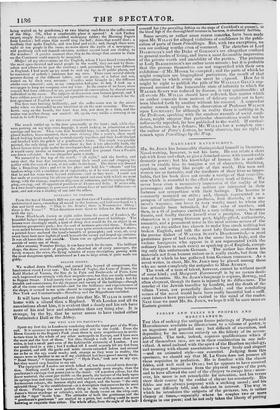MARGARET RAVENSCROFT.
MR. ST. JOHN has honourably distinguished himself in literature. Novel-writing, however, is not his forte. He can relate a short talc with force and effect, or give a detached scene with considerable dramatic power; but his knowledge of human life is not suffi- cient to enable him to imagine a set of characters, thinking, speaking, and acting like people of this world. His men and women are so fantastic, and the incidents of their lives so impro- bable, that his book does not create a vestige of that semi-illu- sion which is essential to the effect of every work of fiction. We never have even a momentary impression of the reality of his personages; and therefore we neither are interested in their fortunes nor sympathize with their feelings. The heroine is constantly mounted on stilts ; and, though represented as a paragon of intelligence and goodness, first discards, at a mo- ment's warning, one lover fa very worthy man) to whom she has actually been betrothed, for the sake of another, and Olen, in a fit 'of jealousy excited by a very trifling cause, becomes frantic, and filially throws herself over a precipice. One of the characters is a young German poet, highly-gifted, enthusiastic, romantic, and a prominent actor in the most serious scenes of the story : yet the author has chosen to make him speak nothing but broken English, and talk the most lofty German sentiment in the precise dialect Of WALTER SCOTT'S Dousterswivel,—a most gratuitous piece of bad taste, for the scene lies in Italy, and the various foreigners who appear in it are represented (with the ordinary licence in such cases) as speaking good English, except- ing only this unfortunate German. The author has drawn his materials not from human nature as it really exists, but from the ideas of it which lie has gathered from German romances. As a novel-writer, in slwrt, Mr. ST. JOHN may be placed among those who arc most completely the antipodes to Miss AUSTEN. The work of a man of talent, however, cannot be without merit of some kind; and Margaret Ruvenserrft is by no means desti- tute of beauties. Mr. ST. J otiSes language is copious, flowing, and often eloquent, though its force is injured by its diffuseness. The murder of the Jewish traveller by banditti, and the death of the villain Vanni, are powerfully described; and the concluding scenes of the novel would have been really beautiful had a suffi , cient interest been previously excited in the mind of the reader. Next time we meet Mr. ST. JOHN, we hope it will be once more on Eastern ground.


























 Previous page
Previous page